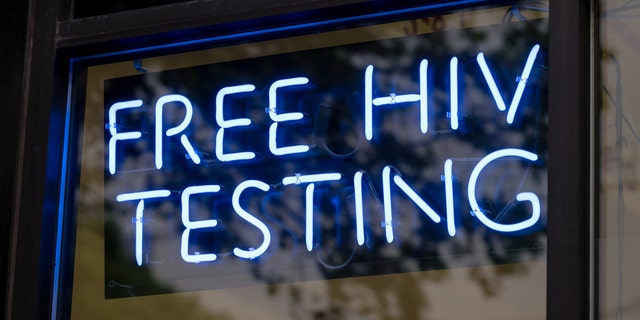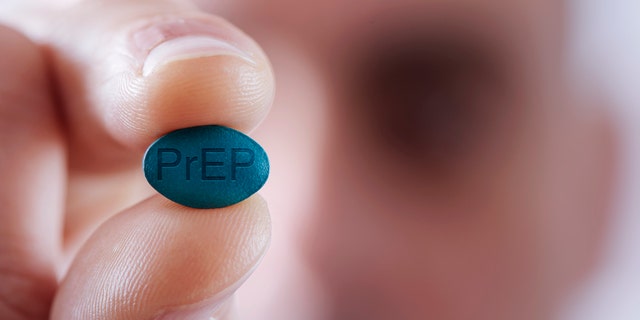
HIV cases have been on the decline in recent years, largely driven by fewer cases among young people, a report from the Centers for Disease Control and Prevention (CDC) found.
Estimated yearly infections were 12% lower in 2021 (32,100 cases) compared to 2017 (36,500 cases), according to the data, released on Tuesday of this week.
The biggest drop was among those ages 13 to 24, who had a 34% decrease in new infections (6,100 in 2021, down from 9,300 in 2017).
NEW FDA BLOOD DONATION GUIDELINES EASE RESTRICTIONS FOR GAY AND BISEXUAL MEN
This decline was primarily seen in gay and bisexual males, which make up 80% of the HIV infections in that age range, the CDC noted. That group marked 4,900 infections in 2021, down from 7,400 in 2017.
CDC recognizes progress, calls for more efforts
“Our nation’s HIV prevention efforts continue to move in the right direction,” said Rochelle P. Walensky, M.D., director of the CDC in Washington, D.C., in a statement on the agency’s website.

HIV cases have been on the decline in recent years, largely driven by fewer cases among young people, per CDC data. (iStock)
“Longstanding factors, such as systemic inequities, social and economic marginalization, and residential segregation, however, stand between highly effective HIV treatment and prevention and people who could benefit from them,” she went on.
“Efforts must be accelerated and strengthened for progress to reach all groups faster and equitably.”
“Decreasing HIV incidence among youth, including young gay and bisexual males, shows us what is possible.”
The CDC credits expanded access to HIV testing, treatment and pre-exposure prophylaxis (PrEP) for driving progress in preventing HIV infections in young gay and bisexual males.
(PrEP is a prescription medication that can reduce someone’s chances of getting HIV from sex or injection drug use.)
BISEXUAL WOMEN MAY FACE A HIGHER HEART DISEASE RISK, NEW RESEARCH SUGGESTS
Knowledge of HIV infections rose from 42% to 56%, while PrEP prescriptions increased from 8% to 20%.
Despite the overall progress that’s been made, that data indicates the progress has not been equitable across all groups.
“There is an increased awareness of HIV status and use of PrEP, but it isn’t across the board,” said Dr. Marc Siegel, professor of medicine at NYU Langone Medical Center and a Fox News medical contributor.

The CDC credits expanded access to HIV testing, treatment and pre-exposure prophylaxis (PrEP) for driving progress in preventing HIV infections in young gay and bisexual males. (iStock)
“Racial disparities persist, with a much higher incidence among the Black and Latino population, as does poverty and distrust of the medical establishment in minority communities,” Dr. Siegel also told Fox News Digital.
Compared to young White gay and bisexual males, the declines in HIV infections were lower among young Black and Hispanic/Latino gay and bisexual males, according to CDC data.
Among White males in the group, there was a 45% decrease in infections.
“The ignorance and stigmatization that have characterized this disease continue to stand in the way.”
The decline was 36% for Hispanic/Latino males and just 27% for Black males.
Regarding PrEP data, only 11% of the eligible Black people got prescriptions for it, compared to 21% of Hispanic/Latino people and 78% of White people.
Among the new infections in 2021, the majority affected gay and bisexual Black men and Hispanic/Latino men, followed by white men.
Even among the smaller subset of women who were infected, more than half were Black, the data showed.

PrEP is a prescription medication that can reduce someone’s chances of getting HIV from sex or injection drug use. (iStock)
Despite the overall decline, Dr. Robyn Neblett Fanfair, acting director of the CDC’s Division of HIV Prevention, said that at least three people in the U.S. still get HIV every hour — even with the prevalence of prevention and treatment options.
“These tools must reach deep into communities and be delivered faster to expand progress from some groups to all groups,” Fanfair, based in Atlanta, Georgia, said in the CDC’s statement.
CLICK HERE TO SIGN UP FOR OUR HEALTH NEWSLETTER
To accomplish this, Fanfair called for increasing the investments in HIV prevention programs, expanding the availability of self-testing and bringing HIV prevention interventions to those who are most affected by the virus.
“Decreasing HIV incidence among youth, including young gay and bisexual males, shows us what is possible,” said Dr. Jonathan Mermin, director of CDC’s National Center for HIV, Viral Hepatitis, STD, and TB Prevention, in a statement on the agency’s website.
CLICK HERE TO GET THE FOX NEWS APP
“But ending the HIV epidemic and achieving equity requires we expand this progress to all.”
Dr. Siegel added to Fox News Digital, “HIV is containable via education, testing and PrEP, but the ignorance and stigmatization that have always characterized this disease unfortunately continue to stand in the way.”

 Latest Breaking News Online News Portal
Latest Breaking News Online News Portal




